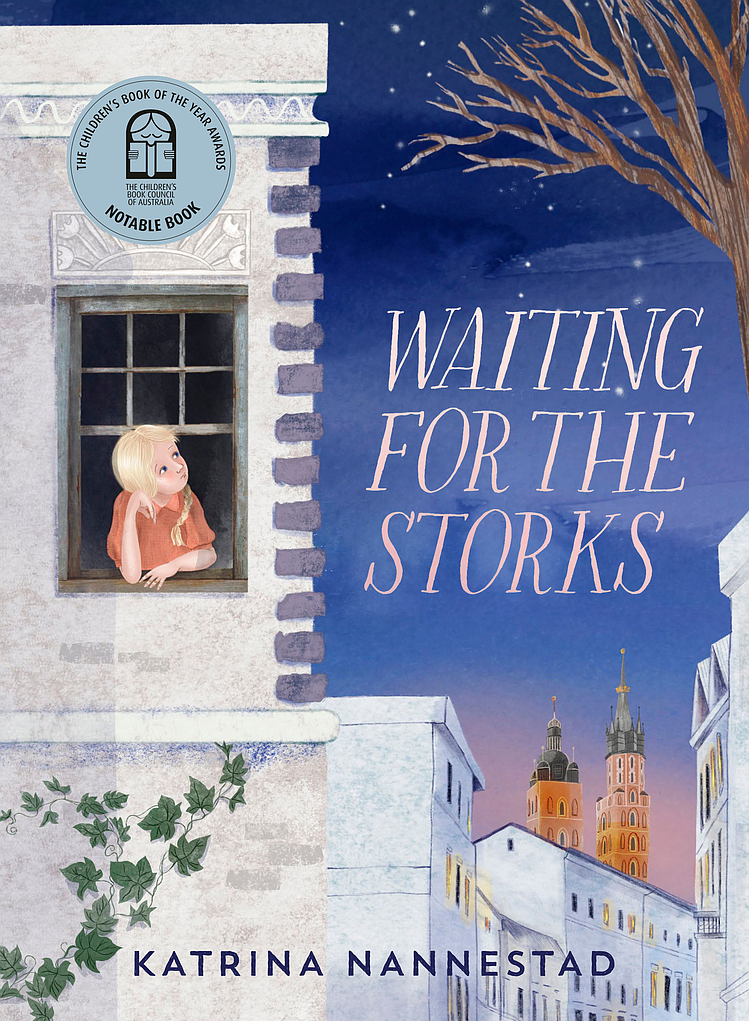
Waiting for the Storks
Katrina Nannestad
Publication Date:
3 Nov. 2022
Format:
Hardback
ISBN 9780733342271
I don't want to remember the truck, or the night I was taken, or the family I left behind. I am not a sad Polish girl. I am a good and happy German girl.
I am. I am. I am.
It's the Second World War and Himmler's Lebensborn Program is in full flight when eight-year-old Zofia Ulinski is kidnapped by the Germans. She has blonde hair and blue eyes, just like the other Polish children taken from their families and robbed of their names, their language, their heritage.
But when Zofia is adopted into a wealthy and loving German family, it is easier, it is safer to bury her past, deep down, so everything is forgotten. Until the Polish boy arrives.
And the past comes back to haunt her.
From Katrina Nannestad, multi-award-winning author of We Are Wolves and Rabbit, Soldier, Angel, Thief, comes a story about family lost and found, and the choices we make when we don't have a choice at all.
AWARDS
Notable - CBCA Younger Reader's Book 2023
Book Links 2023 Award for Children's Historical Fiction - Longlisted
Information
Book Type: Junior ChapterAge Group: 10 years +
Traffic Lights: Green/Amber
Class Novel: Yes
Good Reads Rating: 5/5
Literary Rating: 5/5
Review
Zofia Ulinski lives with her parents in German-occupied Krakow. Her father, a tailor, sews secret messages for the resistance into the garments he sends around town. One day while making deliveries, Zofia and her mother are stopped by the SS. Zofia does her best to keep quiet and still, but the sight of the German soldiers laughing at her father’s work—made with whatever cloth is available, from aprons to curtains—makes her so angry she just can’t.
Once she has their attention, their demeanor changes: they coo excitedly over her fair skin, blue eyes, and blonde hair. Shortly afterward, Zofia is taken by German soldiers and sent to live at an “orphanage” full of kidnapped Polish children. They are all blonde-haired and blue eyed; the Germans believe that they have good “German” blood.
Over the next few years, Zofia is forced to make an impossible choice: she can either resist the Germans’ attempts to naturalise her into German society, or become “Sofia”, a German orphan. If she decides to stay Polish, she risks being turned out onto the street or worse. As Sofia, she is adopted by a kind, wealthy German couple and showered with affection—and Sofia, starved for more than food after so long in the orphanage, accepts.
Life in Germany is mostly easy for Sofia, though there is some tension between her and another girl at school—Gudrun—who is jealous of Sofia at first, but is eventually won over by her sweetness and courage. But when Sofia runs into a Polish slave boy, Tomasz, her memories of her life in Krakow begin to rush back. She barely has time to process her repressed memories of her childhood before the war is over and she is returned to an orphanage in Poland. Luckily, Tomasz’s father reaches out to adopt her, and she is reunited with her birth mother and father.
A harrowing story of impossible choices, big and small. This is mirrored in Zofia’s favourite game of would-you-rather: for example, she insists that it’s better to be squished by an elephant than to be eaten by a bear—after all, you might be able to survive getting squished. The story of Waiting for the Storks is based on the Lebensborn Program, which the author’s note expands on in more detail. The story also integrates Polish and German folklore, most clearly in the tale of the Pied Piper of Hamelin—which Zofia uses to process her experiences of being taken away from her home—and the fox and the stork, which ties both to ideas of resilience and courage, and to Poland’s affinity for storks.
Themes
historical, Poland, Germany, WWII, white supremacy, brainwashing, kidnapping, folk tales, survival
Content Notes
1. Mention that Dr. Engels smokes a pipe (p. 147). 2. Mrs. Engels dies ina bombing raid—not described (p. 302). Zofia briefly thinks that her parents have been killed, but they appear alive at the end of the book.
How to Use the Site:
MEMBER DISCOUNTS: For Member pricing, please sign in to your Book Curator account.WISH LISTS: Signing in will also allow you to create a wish list. Just choose the heart icon on each product you want to add. To view your list, click on the heart icon at the top right of your screen.
COMPARING PRODUCTS: To compare products, use the scales icon.
TO VIEW OR COMPLETE YOUR ORDER: Click on the cart icon at the top right of your screen.
SHIPPING: Enjoy the low flat rate of just 12.95 shipping and handling to anywhere in Australia, no matter how large your order is.
